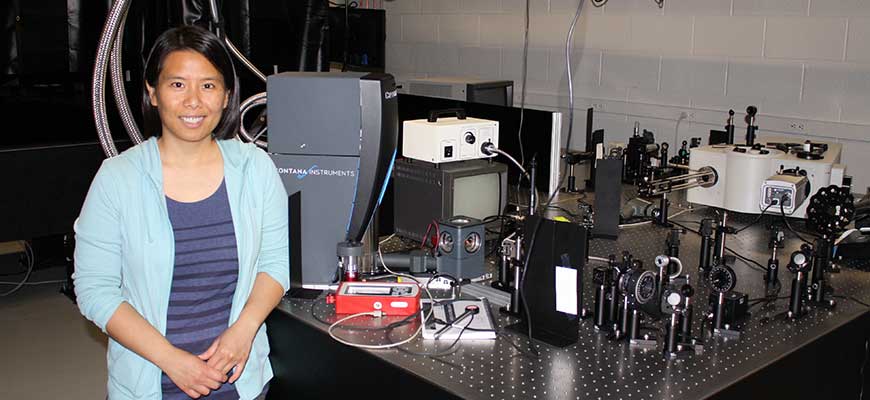
Data traffic controller
Physics professor explores ways to speed up information processing
Posted on: November 3, 2017; Updated on: November 3, 2017
By Mary-Kathryn Craft, craftm@mailbox.sc.edu, 803-576-6195
As our electronic devices — from smartphones to laptops — shrink in size, the potential for information traffic jams increases.
That’s mainly because modern computers rely on electrons to carry and process information.
“As the footprint of electronic hardware gets smaller, electrons traveling in different paths of a circuit start to ‘see’ each other,” says Yanwen Wu, assistant professor of physics in the College of Arts and Sciences. “The problem is they are charged, and they will start to affect each other’s movement. This is bad because it can limit the speed of information flow as well as generate heat.”
By learning physics, you learn the process of logical and analytical thinking. It’s not so much learning just the subject itself, but developing the ability to make connections and extract patterns from observations and then use them to form innovative ideas.
Yanwen Wu, assistant professor of physics
Wu recently received a National Science Foundation Career grant to explore solutions to this problem. She’s specifically looking at using the photon — a particle with no electrical charge — to carry information, ultimately preventing traffic jams and accelerating data flow. The five-year award is given to outstanding teachers and scholars nationwide to drive research forward and mentor future scientists and engineers.
“The successful implementation of these techniques lays the path to ultrafast optical switches and transistors that can lead to a paradigm shift in information processing technology,” she says.
A second part of Wu’s project that she is equally passionate about focuses on promoting science, technology, engineering and math (STEM) education to K-12 and university students. As a woman who got into science because she enjoys asking questions and solving problems, Wu is committed to introducing female students to the nanotechnology field.
She has made presentations at local high schools and is working with Carolina’s Society of Physics Students on initiatives such as creating a physics study survival guide, planning networking activities and organizing community outreach events.
Wu believes that physics and STEM disciplines are perfect foundations for students of all ages to develop critical thinking skills.
“By learning physics, you learn the process of logical and analytical thinking,” she says. “It’s not so much learning just the subject itself, but developing the ability to make connections and extract patterns from observations and then use them to form innovative ideas.”
Wu constantly explores a variety of teaching methods including creating games and showing pictures of peacock feathers to demonstrate the way light reflects. She emphasizes the importance of mastering concepts over memorizing formulas.
“I always try to get them to understand the big picture. With physics, sometimes it gets a little more abstract, and I try to link it to real world applications,” Wu says. “The goal is to find a way of promoting nanoscience in such a way that my students and young kids can understand and develop an interest.”